John MacDonald (Glasgow Police)
-Glasgow Police- (1898-1988)
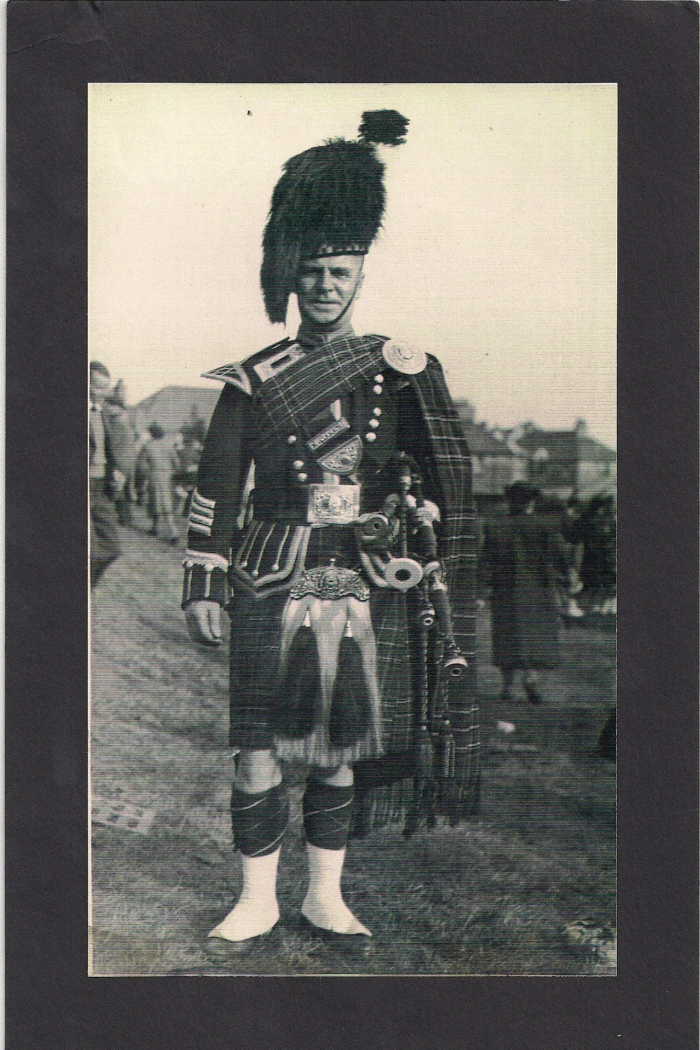 To the Gaelic speakers, he was Seonaidh Roidein. To the rest, he was John MacDonald of the Glasgow Police, or John MacDonald, South Uist. But to all, he was a larger-than-life piping figure: an upper echelon soloist, superb composer, one of the greatest Pipe Majors in the history of the pipe bands, and ‘a true Highland gentleman.’
To the Gaelic speakers, he was Seonaidh Roidein. To the rest, he was John MacDonald of the Glasgow Police, or John MacDonald, South Uist. But to all, he was a larger-than-life piping figure: an upper echelon soloist, superb composer, one of the greatest Pipe Majors in the history of the pipe bands, and ‘a true Highland gentleman.’
He was born in South Uist off the west coast of Scotland in 1898. His great-great-great-great grandfather was John of Moidart, Chief of Clanranald, who fought at Inverlochy in 1645. His father, Donald (1863-1945), was the twin son of Roderick and Anabella MacDonald, and was born in 1863.
Donald and his wife Bella McDonald (1868-1959) lived near Daliburgh, South Uist, where Donald was a piper and taught Highland dancing. He was still dancing in his 60s at the Askernish games in the 1920s. His twin sister was not a piper, but two others were (they later emigrated to New Zealand), as was his older brother Ronald (1852-1921) and a brother, James, said to have been piper to the Marquess of Bute.
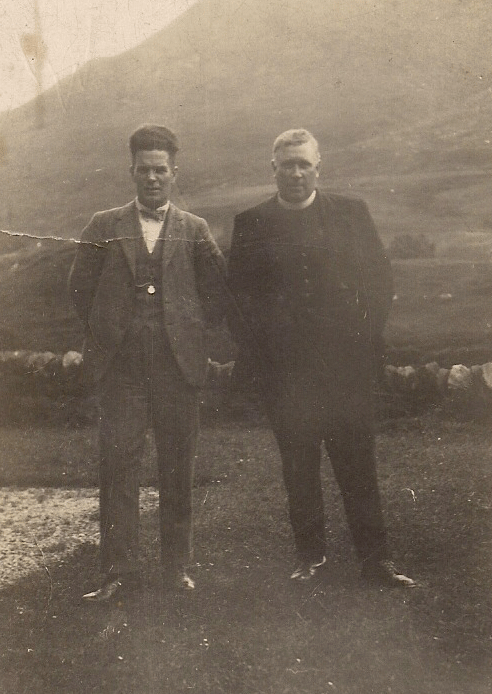
Donald introduced his son John to piping and dancing at a young age, and he quickly became renown as a superb piper for dancing. In these days, the great dancers were men, and it was common for young pipers to be taught to dance. John’s brother Roddy excelled at it and would later dance on the Glasgow Police dancing team. Many of the dances these boys learned, such as “Over the Water” and “The First of August,” are rarely performed today.
After primary instruction from their father, young John and his brother Roddie met another John MacDonald – this one the great John MacDonald of Inverness, widely regarded as the premier piobaireachd player of his generation. Young John was nine, and the great man held classes in Daliburgh. Later, when young John moved to Glasgow, he would come under the tutelage of another piping giant, Pipe Major Willie Gray (1885-1962), then pipe major of the Glasgow Police Pipe Band.
John himself would later teach many a piper, and by all accounts, although one of the kindest gentlemen you could meet, he would be honest in his appraisal of a young piper’s playing so that no time would be wasted by either teacher or pupil. He was well known to be a contemplative man – a “deep thinker” in those very words – and while he was the best of the two brothers as a player, Roderick was known as the better teacher for his ability to connect more closely with less experienced pipers.
John’s niece, Ishabel T. MacDonald (Roderick’s daughter), recalls that John and Roddie had a huge repertoire of old traditional Uist strathspeys and reels. John used to play at dances with his father, who learned the tunes from the old pipers and taught them to his boys. Years later the brothers would bring many of these tunes into the mainstream of piping through the Glasgow Police Pipe Band.
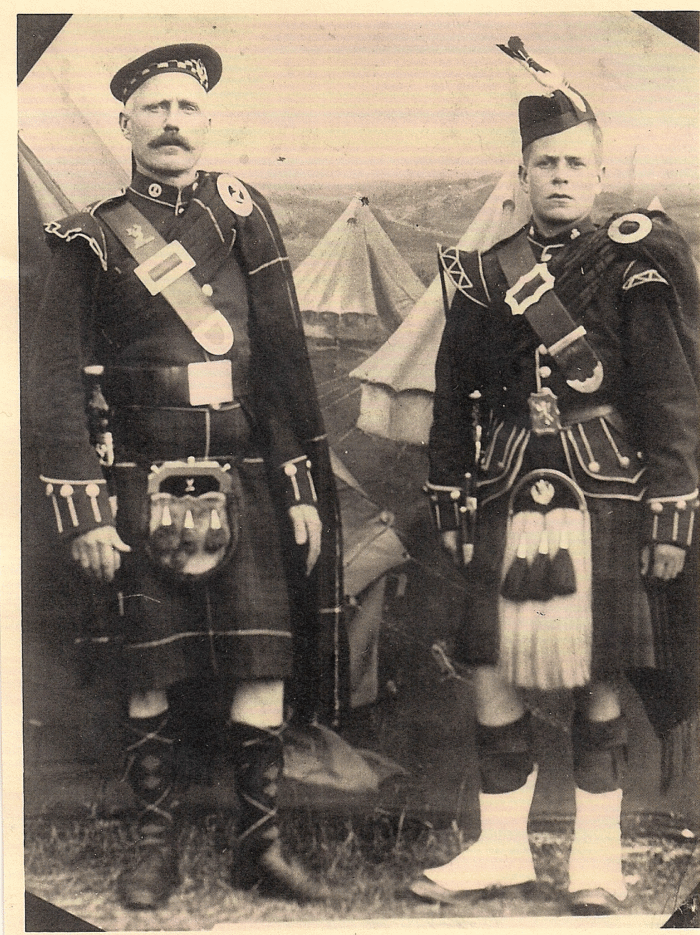
When his father Donald was leaving to serve in the Great War, John was keen to enlist too, so he falsified his age and joined the Cameron Highlanders. He was a big boy, and muscular, and it has been said that such was his enthusiasm that he walked cross-country from Mallaig to Inverness to join the 3rd Camerons. He was 15, and initially he stayed behind as personal piper to MacIntosh of MacIntosh. He would see action later in the conflict, serving with the 6th and 7th Camerons in France and Belgium.
In 1920, at age 22, he left military service and joined the Glasgow Police force. As a beat cop, patrolling the same street on foot day after day, he was well known as a kindly constable who befriended and aided the elderly and infirm wherever he could. He was a gentleman, always eager to help out beyond the call of duty.
In 1942, he was promoted to Inspector.
Of course, very shortly after he had joined the force in 1920, he was recruited into the pipe band.
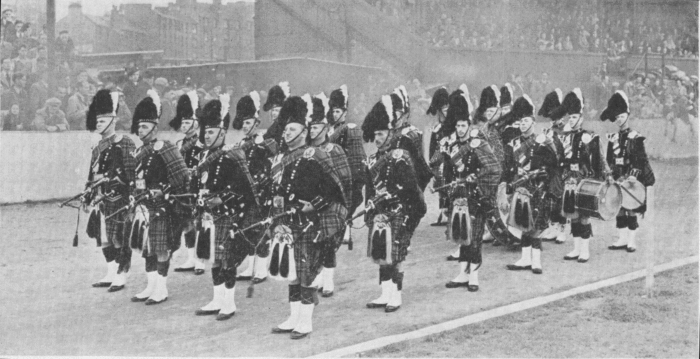
Arguably the greatest and most storied pipes and drums ensemble of all time, the Glasgow Police Pipe Band began as the Govan Burgh Police Pipe Band, the first pipe major being a Constable Bremner. The band would be absorbed into the greater Glasgow force and led by Willie Gray from 1920 until 1932 when John MacDonald took over. One of John MacDonald’s great compositions – ”Pipe Major Willie Gray’s Farewell to the Glasgow Police” – would mark the retirement of his predecessor. It was first published when a copy in Gray’s stylistic hand appeared in the February,1941 issue of thePiping and Dancing magazine.
During the Second World War, the Glasgow Police Pipe Band was heard at home and abroad in regular radio broadcasts. John’s brother Roderick and other prominent pipers of the day such as John Garroway and Charlie Scott also filled the ranks.
John MacDonald enjoyed his first successes as a solo competitor as early as 1913, competing along with other pupils of John MacDonald of Inverness at South Uist games. He kept his hand in competing even during the Great War years, winning the 15th Divisional Championships in France.
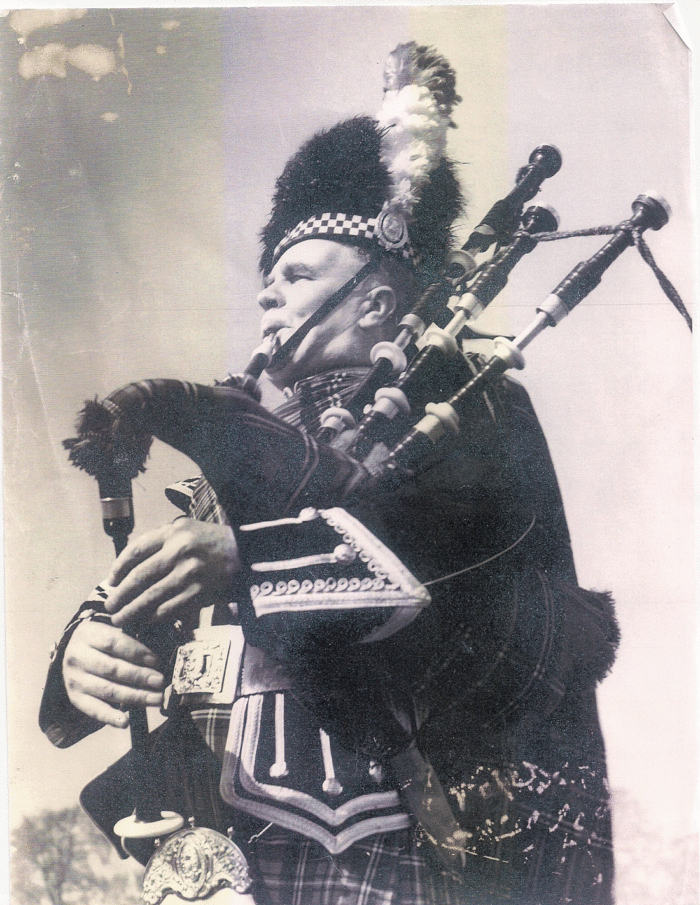
But the best was ahead, In 1926 he became one of only a handful of players to win the Oban and Inverness Gold Medals in the same year. In fact, his competitive success that year during the Oban-Inverness week was almost unparalleled. At the Argyllshire Gathering at Oban on Day 1 he won the Gold Medal and Open Piobaireachd events. On Day 2, he won the Strathspey & Reel and was 2nd in the Former Winners March, Strathspey & Reel. The following week, at the Northern Meeting, he won the Gold Medal as well as both the March and the Strathspey and Reel. It was a stellar week for the 28-year-old from South Uist.
He was of course a regular in the prize lists at the games around Scotland, and was also known to win the best-dressed prize on occasion.
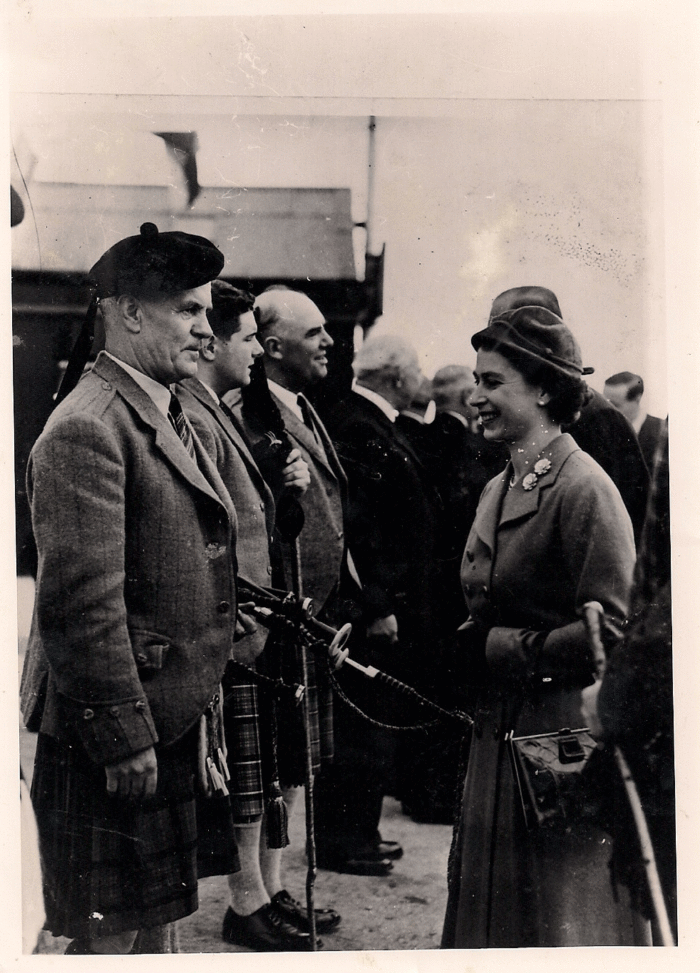
As pipe major of the City of Glasgow Police Pipe Band, his success was equally impressive. Under his direction, the band won no less than 8 World Pipe Band Championships — 1936, ’37, ’38 and ’39, 1946, ’47*, ’49 and 1951. (*The 1947 title at Cowal was disputed at the time, as control of the World Pipe Band Championship was in transition.)
He composed a small but lasting number of fine pipe tunes. “Burnside Cottage” was named for his croft house. “Ishabel T MacDonald” was named for his niece. “The Pipers Controversy” was written when he had overheard some pipers in the pub debating who should have won what that day. He interpreted the different views and opinions as up-and-down melodic fragments which he incorporated into the tune. “Willie Gray’s Farewell,” the superb jig “John MacDonald’s Exercise,” and the “Glasgow Police March Past (The Sands of Loch Bee)” are all now staples of the Highland piping repertoire.
After more than 25 years as pipe major of the Glasgow Police Pipe Band (plus another dozen years under Willie Gray), John MacDonald retired from the band and the force in 1958 and promptly returned to the family home, Burnside Cottage, on South Uist. Built in 1903, the croft had walls four feet thick as protection against the harsh north Atlantic gales. The windward side had no windows, better to preserve the heat. Beyond the house lay the ocean, next stop America.
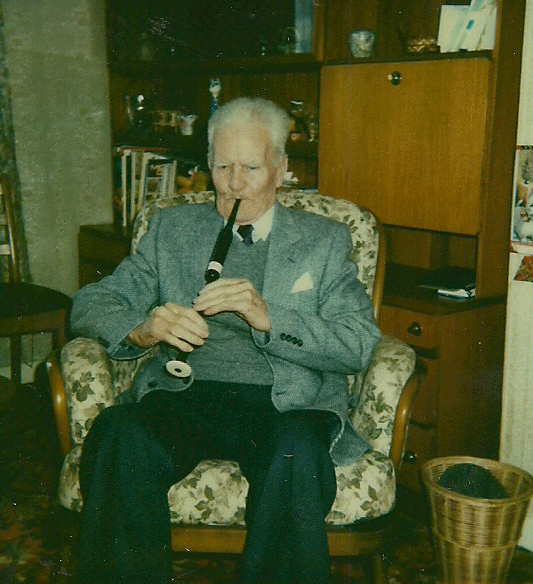
It was a comfortable abode where the old Pipe Major welcomed pipers with a dram. A pupil coming for a lesson might be asked to bring a few groceries from the shop. Visitors might see the hens, a duck, the cats and dogs wander in the back door and out the front. He kept some sheep and cows, and was said to be very fond of all the animals. Friends and relatives still recall his kind and generous nature, and pipers from the mainland and elsewhere would make special trips to South Uist to visit John even when he was well into his eighties. He loved these visits, and revelled in the talk of piping and pipers. He continued to pipe, often playing for local functions in and around Lochboisdale.
Tragedy struck near the end of his life. His sight hampered by cataracts, he was trying to light the peat fire one day when stray sparks set the couch alight. The croft was quickly ablaze and he was forced to retreat outside. The devastation was total, and old John lost his music, piping memorabilia and medals, three sets of pipes, and a striking portrait of himself painted by an American artist. All of his worldly possessions were consumed. But he moved forward and never complained about his losses.
Subsequent surgery greatly improved his eyesight, and during his recovery, he travelled by train with his niece Margaret, to stay with her in Glasgow. She vividly recalled how keen he was to reach the next station, and the next one again – simply to marvel at how clearly he could read the place names on the station signs. He commented with surprise and delight how the sheep were so white and the grass so green.
In the mid-1980s, he secured a pensioners house in South Uist near the main road. Here, he was more accessible to pipers than ever, and his last two years were full of visitors whom he received eagerly and gladly.
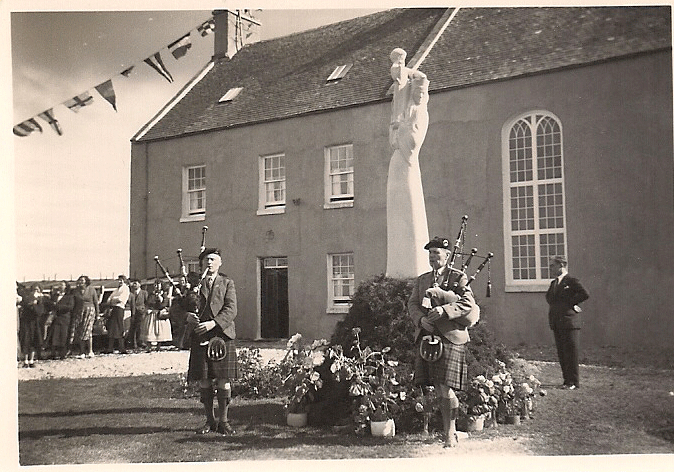
The rest of his two brothers and three sisters had found their way to various locales in Scotland and overseas. Many years earlier, sister Bella had married in South Uist on a weekday, and by the weekend was sailing with her new husband to Canada on ‘The Marloch.’ “I can hear father playing on the pier,” she wrote in a postcard as she described her heartbreaking departure from home, a ritual so often repeated in the previous centuries.
Brother Roderick of course became a leading soloist and piper with the police pipe band. The third brother, William, stayed on at the croft in South Uist for many years. Sisters Mary Ann and Harriet went to the mainland and Glasgow.
Seonaidh Roidein slipped peacefully away in hospital in 1988 at age 89 after a bout with the flu, his niece Margaret by his side. He considered himself to have had a good life and good health. His final conversation was of having just listened to some dance music. “You know, they didn’t get that tune quite right,” he said, surely a piper to the very end.
August, 2010
Janette Montague and Jim McGillivray–From private conversations with the late Margaret Macpherson and the late Tony Macdonald, and information from Ishabel T. MacDonald, the late John Finlay, Hector Russell, Willie Morrison, Jeannie Campbell and notes from the College of Piping, Glasgow.

6 Comments
A very interesting summary of Seonaidh Roidein’s life. Would it perhaps be possible to indicate who of the informants are now deceased?
I’ve updated the “thank yous” in the Seionaidh Roidein bio. Margaret MacPherson, Tony MacDonald and John Finlay have all passed on. As far as I know, Ishbel T. is still with us.
When I chatted with her online earlier today (I’m out of the country at the moment), she very much was, and is still teaching Gaelic singing at the Royal Conservatoire of Scotland – among others, to pipers choosing that as a second study, which maintains both a family connection and a centuries-old link between the two forms of music. (I’m her other half, by the way.)
I’m glad to hear from you. Would you mind if I continued this by email? I’ve not met Ishbel, nor did I know she was in Glasgow. I’d be pleased if we might meet when I’m over. JM
I’m sorry to hear Margaret is no longer with us. I very well remember that great evening when I visited her in Mosspark and Tony MacDonald was there. We had the very best conversation, with such warmth and generosity flowing between the two, and they showed every keen-ness to share their stories and photos and memories with me for this article.
My dad, Walter Leadbetter, was also a piper and won the junior championship in 1934, at the age of 14. He lived in Thornton and then Lesie in Fife.
I am sure he was taught by “Jock” Macdonald and he also spoke of Pipe Major Willie Gray.
He joined the Scots Guards and fought in the 2nd World War